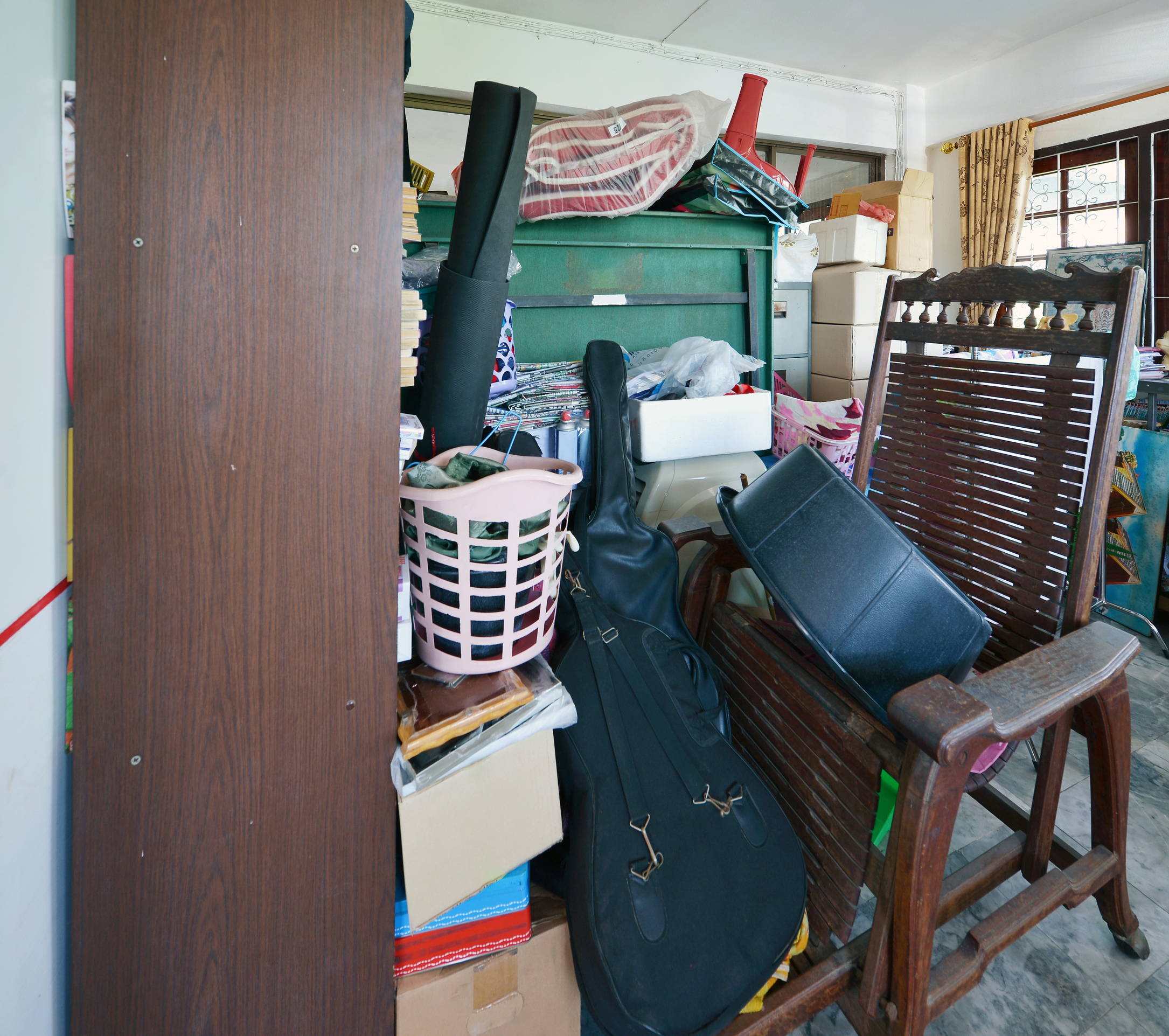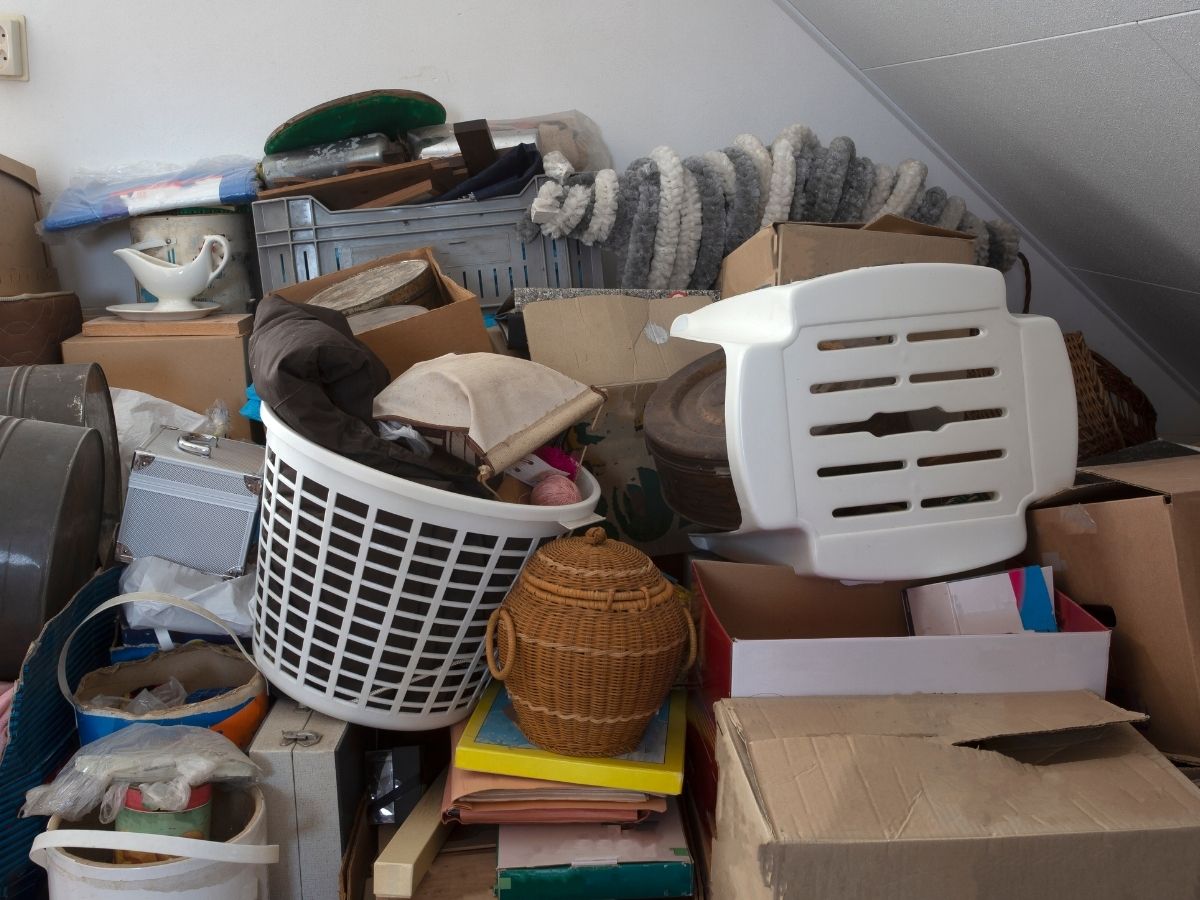If you know a hoarder, live with someone who hoards, a loved one is hoarding, or even tend to hoard yourself, KC Dumpster is here to help. In the article below, we dive into the psychology of hoarding and give tips on how to help as well. It is no secret that hoarding can be a problem, but, without judgement, let’s look at the why behind the disorder. After the why, learn all about ways to help and declutter.
What Exactly is a Hoarding Disorder?
Hoarding is a mental illness that is clinically recognized. Individuals that have a hoarding disorder have difficulty getting rid of items that they perceive as items they need or may need in the future. Items of little value that otherwise classify as trash may fall into this category. The notion of having to throw things away causes tremendous, even crippling, pain in a person suffering from a hoarding disorder.
When an excessive collection of trash and items that would not be kept by most individuals develops, this is the result of a hoarding disorder. Over time, the amount of accumulation can impact and eventually eliminate habitable space in the home. Below are signs of the psychology of hoarding and what the disorder may look like to the hoarder.
- Avoiding the disposal of items that have no worth to you or anybody else.
- Feeling moderate to severe worry about getting rid of anything.
- Adding to the stockpile without realizing there is an issue.
- Cluttered rooms in the home that are no longer usable for their intended function.
- An overabundance of possessions endangering one’s safety, health, or cleanliness.
Hoarding tendencies can range in intensity, but if you notice more than one of these circumstances in your loved one, it’s critical to get professional help before proceeding.

The International OCD Foundation can assist you in locating a therapist in your area who specializes in hoarding issues.
If your situation is less severe, but you still have a lot of junk to cope with, check out this article on how to declutter your home and keep reading for more tips.
The Psychology of Hoarding – Tips for Helping Your Loved One
Decluttering a hoarder’s home requires extensive patience, understanding, organization, and more. Keep reading for tips on how to help your loved one with decluttering.
Seeking Professional Help
You can help your loved one declutter and clean after you’ve linked them with a mental health specialist to address the underlying issues that are causing their hoarding tendencies. Determine the severity of the crisis and the number of persons who will assist with the cleaning. Consider your loved one’s growth as well – can you handle the hoarding site without the assistance of a professional organizer, or do you require professional assistance?
“A skilled professional organizer with hands-on experience dealing with big volumes of clutter will be able to give sorting and organizing assistance, as well as structure to the cleanout process.”

Leave the Judgement Behind
One of the first and most important things you can do to help someone with a hoarding condition in purging is to approach that person in a calm and non judgmental way. It is important that you convey your support and listen to them. You do not even need to bring up the hoarding issue at the beginning of the talk. The ultimate goal is to build your relationship with the individual battling with hoarding and to demonstrate that you are a trusted confidant.
Gradually, you will be able to talk with them about their life and bring up the issue of the amount of things they are accumulating. Practicing patience is imperative. Instead of passing judgement, take the time to truly listen.
Suggestions for Multifaceted Assistance
It is critical to communicate effectively with an individual that has a hoarding disorder. The significance of staying nonjudgmental throughout this process is imperative. Once you feel you’ve built a relationship with a loved one, and you believe they have a reasonable degree of confidence in you, propose that the individual could benefit from some assistance.
In truth, a hoarder requires assistance in two areas. First, they need hoarding treatment, which includes professional counseling. Second, a person in this situation requires practical support in decluttering and removing the hoard.
Keep in mind that many, if not most, hoarders do not recognize that they have a problem. Indeed, a person suffering from a hoarding disease is prone to believe that acquiring things is necessary and proper. Consequently, such a person may be inclined to take extraordinary measures to defend their hoarding, even becoming confrontational.

The key is to be patient and never press the hoarder to get rid of things right away. Instead, a good tactic would be to propose that getting rid of particular objects in the house will improve their life and make their home more comfortable for them.
For example, if their kitchen is overflowing with stuff (as is frequently the case), minimizing the hoard might free up their appliances allowing them to cook meals. The same applies to a bedroom or bathroom as well. By removing stuff from these places, a person suffering from hoarding disease can begin to live more comfortably each day.
Create a Strategy With the Hoarder
Given the state of the hoarder’s house and the quantity of clutter they have accumulated, you may be wondering, how you can quickly eliminate unnecessary items and trash. Unfortunately, this mindset is not generally the best approach and leaves you in a position of mistrust.
Another crucial thing to remember while assisting a hoarder in decluttering is to have that individual as involved in the process as possible. Create an action plan with the hoarder in which they have ownership of the process. The exception is when a person has been physically or mentally disabled and cannot understand what is happening.
The goal of the plan is to identify what to save and eliminate. The plan must also specify how you will get rid of things.

When you choose items to get rid of, put them in a holding area for an agreed-upon amount of time. By taking this action, it assures the hoarder that these items are not lost forever. If they change their mind, they can retrieve the item.
Begin the Decluttering Process Slowly
When decluttering, your first thought may be to just in and start the decluttering process. That is a natural tendency – for you.
However, taking such an approach with a person suffering from a hoarding condition may completely derail the cleaning process. Remember that a person does not become a hoarder overnight. Decluttering a hoard, by definition, cannot be accomplished in the blink of an eye. You do not need to understand the fundamental reason for hoarding or the psychology of hoarding, but acknowledging the hoarder’s sentiments is a conscious process.
Don’t Be Afraid to Seek Professional Help
As we mentioned before, carrying the burden of hoarder cleaning is not something you have to take on yourself. Knowledgeable and sympathetic mental health specialists are available to help you and a hoarder clean up and declutter. A specialist like this knows the methods and procedures for decluttering and clearing out unnecessary items.
Implement Strategies to Prevent Future Accumulation and Clutter
Finally, the absence of a plan to avoid future accumulation and clutter may result in the hoarder’s relapse. As a result, particular techniques for preventing future overaccumulation of objects are critical.
Create a Waste Removal Strategy
When you assist a hoarder in cleaning out their home, you will most likely have a lot of things that you need to throw away. Therefore, it is critical to have a quick and straightforward option for getting rid of waste in each room of the house.
For tasks of this scale, renting a dumpster is a simple alternative. You may fill the container while you work and have it removed as soon as you’re through. However, keep in mind that if your debris pile is left unmanaged, this may entice someone with a hoarding problem to remove items from the dump pile.
KC Dumpster is the dumpster rental company to call for any type of project including decluttering a hoarder’s home. We deliver the dumpster right to you and haul it away when you’re finished.

Last Thoughts on the Psychology of Hoarding
Decluttering may be emotional and time-consuming, especially in a critical scenario. However, getting organized is advantageous for a variety of reasons. For example, when you assist a hoarder in cleaning their home, you will give them a sense of control and achievement and enhance their general quality of life. So, with the tips above, remember to enter into the situation without judgement, come up with a plan side by side with your loved one, and stay as patient as possible throughout the process.
Because helping your loved one and understanding the psychology of hoarding can be challenging at times, make hauling away the trash and debris simple with the help of KC Dumpster. Contact us today to rent the dumpster you need!
Leave A Comment